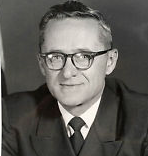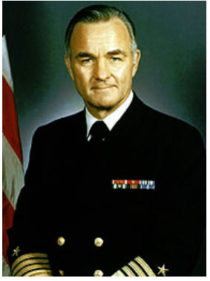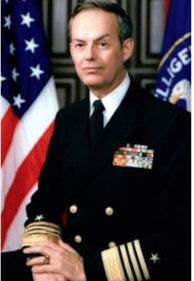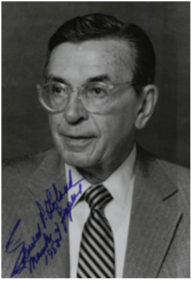Players
28 November 2016
Editor’s Note: Just when you think you have seen it all and had enough, there is the reminder that times past have been at least as wild and wooly as they are now. I was going through some old notes and newly-declassified cables to give a sense of the late 1970s and the Carter revolution in Washington. I hate to say it, but compared to launching P-38 Lightning fighters to ambush and kill Admiral of the Imperial Japanese Fleet talk about Budget, Plans and Programming in a post war draw-down seems kind of tame. Trust me, for the participants it is not, even if the general public will never know the joys of attending a meeting of the Deputy’s Committee in an airless secure conference room just off the E-Ring in the Pentagon. And things were pretty tense then. Let’s take a quick review of some of the players, famous and infamous, with whom Mac interacted while at the CIA.
– Vic
Players

(Admiral Showers in the 1970s).
Talking with Mac was a way to time-travel to the years of great danger to the Republic, both in economic terms and in armed conflict.
We could transcend the dark coolness of the Willow bar and travel down the years of the Great Depression in his native Iowa was a novel experience, at least until we entered into our own version of economic bust in 2008, and he used it as a useful means to put our current pain in context. Then, the stories of going to war, and being present right through the course of the whole dramatic narrative of the savage war in the Pacific, are riveting.
At least they are in the hearing of them with a nice glass of Willow’s Happy Hour White. If I don’t get across how astonishing it was to have Mac as a pal, the fault is entirely mine.
Mac’s post-war career, and his rise to flag rank in the Cold War came against the backdrop of the war in Indochina, and neatly spans all the decades and phases of the long chilly struggle. Mac had been retired only a few years and still in The Business in 1976 when I wandered into an Armed Forces Recruiting office in a strip mall in Grand Rapids, Michigan, and inquired about jobs as a fighter pilot. I was sick of the Carter Malaise and had decided I wanted to go to the show and see what the elephant looked like.
Between our two careers, we encompassed the entire Cold War, the rising of The Wall and its ultimate collapse. If you think the idea of people sitting in missile silos or cruising silently below the waves in ballistic missile submarines- both sides- awaiting the command to launch was surreal, you ought to take a stab at the process that went into funding all of it. Before leaving DIA, Mac had been chief of plans and policy in addition to being the Chief of Staff to an organization of thousands of analysts and intelligence specialists.
In late 1976, Saigon was just a memory, and money had to be found for other vital Government activities besides intelligence. Legendary lawmaker Eddie Boland was sizing up the job of bringing the Intelligence Community to heel with his Select Committee on Intelligence that he stood up in 1977. The return of the Democrats to power in 1977 had big time implications for the intelligence community. After eight years in the political wilderness, Democratic politicians were eager to get into the White House and fix the “Watergate mess.”
This would naturally include a thorough housecleaning of the Augean intelligence stables, tarnished by the public revelation of the Crown Jewels of the CIA covert operations program to Congress. One of the areas most subject to abuse was Human Intelligence (HUMINT). The Directorate for Operations at Langley was the first to be thrown under the bus in a long and bitter struggle between two admirals: CIA Director Stansfield Turner and NSA Director Bobby Ray Inman. Turner, the Twelfth Director of CIA, was the man dispatched to clean up Langley once and for all.

(Admiral Stansfield Turner)
He earned the distinction of being perhaps the most hated man who ever served there. I was sitting in the rotunda of the National War College a few years ago when I realized who was sitting in front of me. It was the Admiral, all right, the guy who single-handedly purged the Directorate for Operations of over 800 veteran Spooks. My pal Charlie from the Senate Committee was there for that, a naval officer seconded to the Agency as a guy Turner could trust, since there wasn’t anyone else he could.

(Admiral Bobby Ray Inman)
Turner was a tough old Annapolis ship-driver with an aloof personality and a distrust for non-Academy intelligence people like Inman. Bobby Ray is a legend in the business, a career intelligence officer who would also get his fourth star, the first intelligence specialist to do so (until Bill Studeman, Mike Hayden, Keith Alexander and Mike Rogers).
Talking to Mac not only personalized history, but I realized we were getting to my time in the secret world. I sat behind Admiral Turner at a lecture one time in the soaring atrium of the War College at Fort McNair ten or fifteen years ago, and Admiral Inman has always been courteous, the last time being the gathering of former Naval Intelligence Flag Officers for dinner at Willow. I attended with Mac in my role as the community’s Cub Reporter Jimmy Olson.
The battles between Inman and Turner were legendary, and about mission- but that involved Washington’s most important commodities here: money and power. One thing all the figures in the Carter Administration seemed to agree on was that HUMINT was messy and had great potential to spin out of control. Accordingly, all priority went to the development and fielding of sensors that provided objective intelligence in denied areas- what we call with the antiseptic euphemism “National Technical Means.”
Mac was helping to implement the Foreign Intelligence Surveillance Act (FISA) courts- the secret chambers where classified matters could be adjudicated without public disclosure of “sources and methods.”
It would transform the whole oversight process and ensure the public’s right to privacy was respected. It didn’t work out that way, certainly not the way President Carter planned, but as usual, Mac did an efficient job. Meanwhile, the anonymous people that tweaked numbers and drafted the components of the (classified) Intelligence Budget were scurrying to apply the Carter policy decisions to the budget.

(Legendary Massachusetts Congressman Edward “Eddie” Bolan)
I know, I know, the quickest-acting and most effective anesthetic in the world is a good long PowerPoint “rack and stack” budget briefing. But in case you need a quick nap, here is it. My Left Coast Attorney called me up to comment on Congressman Eddie Boland.
I mentioned that retired Air Corps Colonel Jim Bush (and budgeter-for-life) used to regale us with stories of the colorful legislator. Eddie was a piece of work. He went to Washington with the man who would become speaker of the House, Thomas P. “Tip” O’Neill, in 1952. Eddie was a bachelor for the twenty years they roomed together in what they called a real-life “Odd Couple,” with Boland being the Jack Lemmon to Tip’s Walter Matthau.
Scratching backs is how things work here, and Tip appointed his room-mate to be the Chairman of the Select Committee on Intelligence. That was the post that made Eddie a household name. He took over the committee months after disclosures that the Central Intelligence Agency had spied on American citizens and tried to assassinate foreign leaders.
Congress, both chambers being controlled by the Democrats, was determined to reign in the Executive Branch, and Eddie was directed to take his new oversight role seriously as he sought a bipartisan consensus on intelligence matters. That is what led directly to the legislation that bears his name: The Boland Amendment.
It is still around, though we do not seem to hear much about it since the Global War on Whatever started. The Reagan administration was determined to put vigor back into American policy in Central America and to unseat the Marxist Sandinista government in Nicaragua.
They funded the Contra rebels, as Eddie offered successive amendments to restrict military and humanitarian assistance and then end it altogether. Insisting he was in ”complete sympathy” with the effort to curb communism, he believed the Reagan Administration’s approach was “duplicitous and counterproductive.” I had to find that quote to get Mac’s reaction, since the reason he was brought into the IC leadership was to handle the new and intrusive role of the Senate and House Intelligence Committees.
Anyway, the Attorney called me up on the cell from California the other day. “Funny you should mention Eddie Boland,” he said. “You refreshed my memory of working on the Hill back then, The Congressman was the fourth guy who rode in my old Rambler when I took Tip O’Neill, Jim Delaney, and Eddie to Mass in Washington in 1966 on the Feast of the Assumption.”
“Interesting ” I said. “Mac’s story blends right into yours.” The thought stayed with me after the Attorney clicked off to go to court in sun-kissed San Diego.
Besides Mac and Jim Bush, there were all sorts of old pals who had ring-side seats to what was going on in Washington in those tumultuous days of violence abroad and in the streets of America.
Then the Watergate revelations and the downfall of the South Vietnamese ushered in the age of the Congressional hearings. The Nixon pardon may have undone Gerald Ford’s chances of re-election. The arrival of Jimmy Carter placed the intelligence issues on the front burner, and since the only real power in Washington is the ability to grant or take away money, that was the arena in which Mac attempted to act as a sort of traffic cop between the DCI and the Director of NSA.
President Carter’s views on the arms race and human rights led to a bold policy declaration in which he would include deep budget cuts in strategic forces and intelligence. He vowed to scrap Nixon and Ford-era accords with the Soviets and go for deep cuts in overall force levels.
Carter’s negotiators fashioned a proposal to bring launcher levels in the superpower inventories down from 2,400 apiece to between 1,800 and 2,100, and equivalent cuts to the number of Multiple Independently Targeted Launch Vehicles (MIRVs).
The original Carter proposals were aimed at the entire strategic Triad- bombers, boomers and ICBMs. Medium-range missiles and the troubling new technology of road-mobile launch systems were on the table as well.
Mac was trying to implement the directives contained in the Schlesinger Report about the out-of-control intelligence community. Jim Bush was still on active duty as a blue-suit Colonel then. He used to come and see me when I was a budget staff director in the Pentagon; he was old then, in his late seventies, but he had stories like Mac’s, about things like building the new wing on CIA Headquarters and bombing Japan in his B-29. He was an interesting man.
At the tail-end of his active career he was snagged by the green eyeshade crowd as I was. That is a mixed blessing. Jim developed a specialty in the intelligence budget, which then was swimming in bucks to run things like the U-2 reconnaissance program. He was a vigorous participant in the desperate skirmishing against the dramatic cuts in budget authority that came with the end of the Vietnam War. Mac used to see him at many of the meetings at the Pentagon to fight over resources.
Jim was working for a budgetary legend named Jim Vance, who Mac recalled one afternoon at Willow as being the “the biggest budget magician of all time. Vance knew where the skeletons were buried and who had buried them.”
They eventually got rid of Vance, though he went out of government with his life intact, something that was not universal in those tumultuous times. Things had become much more gracious in Washington after the chaos of the ‘60s.
Vance unfortunately got a little big for his britches and made the mistake of taking on Fort Meade. NSA was in the middle of a desperate downsizing effort when, in 1973, it was hit with a round of-budget cuts which became known as the “Clements Cuts,” intended to harvest the savings from the American draw-down in SE Asia and channel the savings into social programs. The real author of the directive was Vance, who worked for Dr. Albert Hall in the budget shop of what we know now as the Office of the Undersecretary of Defense- Intelligence (USD-I).
Through his Boss, Vance contended that cryptology was overfed and underworked, and he embarked on a detailed study of the cryptologic system. The upshot was a recommendation that NSA absorb an additional three percent salami-slice in resources.
Clements imposed a total Consolidated Cryptologic Program (CCP) billet reduction of 12,999 government employees to be completed by fiscal year 1978. (Since the cryptologic budget already showed a large reduction during that period, the real additional manpower cut was “only” around five thousand jobs.
Vance specifically called out the problem with NSA- he said it was “a bloated management system with overlapping authorities” and the potential of new technology to increase efficiencies.
Stop me if any of this seems familiar. It is always a long sine-wave of resources in the business, and as predicable as the waves on the beach behind the schoolhouse at Dam Neck, Virginia.
Funny how it is that the budget people wind up making policy by the simple means of programming. Watch what is happening on the Hill right now with the dramatic change in priorities between the in coming and outgoing crowds. It is amazing.
But of course, Mac was struggling to set up the framework of preserving American liberty while maintaining an intelligence capability compatible with the Constitution and the wild-eyed idealism of that Georgia peanut farmer.
It may be one of the larger tributes to Mac and the Community Management Staff’s vigilance that Admiral Turner lived through it.
Copyright 2016 Vic Socotra
www.vicsocora.com
